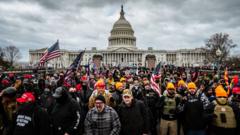Following president-elect Donald J. Trump's provocative statements about potentially reclaiming the Panama Canal, there is rising unease in Panama, reminiscent of the past American invasions that disrupted the nation’s sovereignty.
Trump’s Unsettling Remarks on the Panama Canal Spark Concerns

Trump’s Unsettling Remarks on the Panama Canal Spark Concerns
Tensions arise in Panama following president-elect's controversial comments during a press conference.
In remarks made during a press event, Trump suggested that the U.S. might consider reclaiming the Panama Canal, leading to immediate backlash from Panamanian authorities. Foreign Minister Javier Martínez-Acha responded assertively, declaring Panama’s unwavering sovereignty over the canal, stating, “The sovereignty of our canal is nonnegotiable and is part of our history of struggle and an irreversible conquest.”
While many in Panama dismissed Trump's comments as bluster, experts warn of the underlying implications. Some speculate that Trump's assertions might serve as a pressure tactic aimed at negotiating a more favorable position for American ships transiting the canal. This maneuvering could also be strategically linked to Trump’s broader immigration policies, as the region plays a pivotal role in migrant flows toward the United States.
Historical context complicates the situation; Panama's complicated history with U.S. military involvement adds a layer of anxiety over Trump's remarks. Benjamin Gedan, a director at the Wilson Center's Latin America Program, highlighted the potential repercussions, stating that any aggressive moves from the U.S. could lead to international condemnation and destabilization of the canal area.
As Panamanians process these remarks, the dialogue reflects broader geopolitical dynamics, with implications that extend far beyond the canal's borders, reminding many of the delicate interaction between sovereignty and international diplomacy.
While many in Panama dismissed Trump's comments as bluster, experts warn of the underlying implications. Some speculate that Trump's assertions might serve as a pressure tactic aimed at negotiating a more favorable position for American ships transiting the canal. This maneuvering could also be strategically linked to Trump’s broader immigration policies, as the region plays a pivotal role in migrant flows toward the United States.
Historical context complicates the situation; Panama's complicated history with U.S. military involvement adds a layer of anxiety over Trump's remarks. Benjamin Gedan, a director at the Wilson Center's Latin America Program, highlighted the potential repercussions, stating that any aggressive moves from the U.S. could lead to international condemnation and destabilization of the canal area.
As Panamanians process these remarks, the dialogue reflects broader geopolitical dynamics, with implications that extend far beyond the canal's borders, reminding many of the delicate interaction between sovereignty and international diplomacy.




















